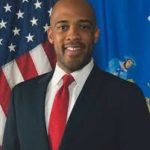Check out the website: https://lenspoliticalnotes.com Look at the recent Political Notes and Len’s Letters on the website:
October 7th , 2022 Political Note #511 Michigan, Wisconsin, and Minnesota elections
2022 General Election
When you think of these states, you think Big 10. Not only these states, of course. We have already considered Pennsylvania and Ohio. We will get to Indiana, Illinois and Iowa.
Michigan, Wisconsin, and Minnesota have, among them, 6 Senators. Their total population is about the same as Florida, which has 2 Senators.
10th largest state: Michigan
20th largest state: Wisconsin
22nd largest state: Minnesota
Only Wisconsin is electing a Senator in 2022, but that race is one of the big deals. All three states are electing Governors. Only Michigan is electing members of its Supreme Court. Michigan has three Congressional Seats among 538’s 50 closest races. Wisconsin has one. Minnesota has none.
Wisconsin Senate Race

Mandela Barnes
538 identifies this as the third closest Senate race. Lt. Governor Mandela Barnes (Political Note #482) is challenging Ron Johnson who is running for a third term. During the primary, several Democrats including the State Treasurer, a county executive, and an Executive from the Milwaukee Bucks thought they would be a tougher candidate against Senator Ron Johnson. Nevertheless, Mandela Barnes won over the Democratic primary voters. Each of those aspirants withdrew from the race shortly before voting day and Mandela Barnes coasted to victory (though a percentage of Democrats thought they would vote for their favorite who had already withdrawn).
Mandela Barnes grew up in Milwaukee. His dad belonged to the UAW. His mom taught school. He went away to college – to Alabama A & M. There he got clobbered when he ran for student office, was inspired by Barack Obama, and needed to complete one course to graduate (which did in 2020). After working as a community organizer (where could he have gotten that idea from?), he ran for the state assembly, defeating in the primary an incumbent who had supported tuition vouchers and opposed a cap on interest for payday loans. Four years later, he lost a primary against an incumbent state senator who had also supported tuition vouchers and had been willing to allow people to carry concealed weapons. Instead of disappearing, Mandela Barnes went to work for the Innovation Exchange, making policy proposals for the state legislature. And he ran for Lt. Governor. In the primary, just in time for the 2018 Blue Wave, he got 68% of the vote against a relatively weak field. In Wisconsin, the Governor and Lt. Governor run as a team. Tony Evers was elected governor by a point.
Mandela Barnes had a spot from which he could run for the US Senate. But he had to play a little defense. He insisted he supported investing in crime prevention, not defunding the police; he supported comprehensive immigration reform, not defunding ICE; he would bring a working class perspective to a US Senate that he saw as a millionaire’s club.
The incumbent, Ron Johnson, would qualify for a millionaire’s club. Mandela Barnes would like the campaign to be about Johnson – about the Trump tax cuts for the wealthy and for corporations that he supported, about Johnson’s belief that climate change has not been caused by human activity, about calls for cutting spending, about opposition to even modest efforts for gun safety, about opposition to the Affordable Care Act, about opposition to abortion, about opposition to immigration grounded in the “Great Replacement” theory, about opposition to a bill increasing the statute of limitations for child sex abuse, and about his support for Donald Trump. Ron Johnson does not even have an issues section of his website. His focus is on attacking Mandela Barnes. Help Mandela Barnes win this election.
- On October 4th, 538 projected that Barnes would win 34 times in 100 and found that he was behind 48.7 – 51.3
- Recent Polls help
- An independently funded A- rated poll reported on September 27th that Barnes was tied with Johnson 47-47
- A Republican funded A- rated poll reported on September 19th that Barnes was behind 47-49
- An independently funded A- rated poll reported on September 18th that Barnes was behind 44-48
- A media funded A rated poll reported on September 15th that Barnes was ahead 48-47
- A Republican funded B/C rated poll reported on September 13th that Bares was behind 45-49
- An independently funded B- rated poll reported on September 13th that Barnes was behind 48-49
- On July 20, Mandela Barnes had $1 million available for his campaign, Ron Johnson had $2 million
Governor Races

Michigan
Inc Gretchen Whitmer
Is there any state where the cultural wars have worked out in so bizaare a way as Michigan? Where else have far right groups attempted to kidnap and kill a Democratic governor. Is it because she is a woman? Mysogyny? Hatred of women especially when they are in charge? Trump’s call of “lock her up” against Hillary Clinton echoed at Gretchen Whitmer.
The right wing has found women they support, among them the Republican candidate for governor of Michigan. The right wing does seem to find the idea of women in power acceptable when they agree about how that power should be exercised.
Gretchen Whitmer (Political Note #381) has been a barrier breaker. She not only became the first leader of Michigan’s Democratic State Senators, she spoke in a debate in the state Senate about having been sexually assaulted.
Gretchen Whitmer knew a lot about Michigan politics while growing up. Her father was head of the state’s department of Commerce and was president of Blue Cross Blue Shield of Michigan. Even after her parents divorced and her mom and the children moved to near Grand Rapids, she saw her dad regularly. She came back to Lansing as an undergraduate at Michigan State, then went to Ann Arbor and got her law degree from Michigan.
Gretchen Whitmer was elected to the State Senate in a special election in the spring of 2006, reelected in the general election of 2006 and again in 2010. Term limited, after leaving the State Senate, she completed the last six months of a prosecutor’s term after he was arrested. The term ended at the end of December, 2016. In January, she announced she would run for Governor in the 2018 election. In response to accusations that she wanted to abolish ICE, she said she would address Michigan’s fundamentals – schools, roads, and water systems.
She touts her achievements – the largest investment in K-12 education in the state’s history, tax reductions for small businesses, refunds for car owners, creating more jobs in the auto industry as well as investments that supported small businesses, high quality pre-schools for four year olds and expansion of affordable child care. She notes that she did all of that while passing balanced budgets and turning what had been projected to be a $3 billion deficit into a $7 billion surplus.
Her opponent is radio host Tudor Dixon. A graduate of the University of Kentucky, she moved to Michigan in the 2000s. After graduation she worked as a sales executive for her father’s steel business. Her business career was interrupted when she had children and a bout with cancer. She returned to work founding Lumen News. She explains in her website, she was concerned about the indoctrination of children in school, so her business would provide “pro-America, pro-Constitution morning news programs to grade school students.” No indoctrination here, of course.
In 2018, after Lumen School News was bought out, she began anchoring the program America’s Voice Liveon a streaming news and opinion site. She supported Donald Trump’s claims of a stolen election and made various unpalatable comments like excusing a comedian’s use of blackface.
She was the last person standing after the completion of Michigan’s chaotic Republican primary (candidates kicked off the ballot for too few signatures and one candidate arrested). Her first campaign issue is education. We can be confident she does not mean indoctrination, right? Help Gretchen Whitmer’s reelection campaign.
- On September 29th, 538 projected that Whitmer would win 96 times in 100 and found that she was ahead 54 – 42.4
- Recent Polls help
- A media funded B/C rated poll reported on September 29th that Whitmer was ahead 50-32
- A Republican funded A- rated poll reported on September 28th that White was ahead 51-45
- A media funded, B rated poll reported on September 19th that Whitmer was ahead 55-39
- A media funded, B rated poll reported on September 13th that Whitmer was ahead 51-40
- A media funded, B/C rated poll reported on September 1st that Whitmer was ahead 48-35
- A Republican funded, A- rated poll reported on August 25th that Whitmer was ahead 49-45
- An independently funded, B rated poll reported on August 23rd that Whitmer was ahead 50-39.
- On September 29, NBC news reported that Whitmer had $14 million available for the balance of the campaign, Dixon had $500,000
Minnesota

Inc Tim Walz (Political Note #479) is running for reelection. Like Gretchen Whitmer of Michigan and, in a way, more importantly, like Tony Evers of Wisconsin, Tim Walz was elected in 2018. Wisconsin and Minnesota are often compared. Evers followed a Republican governor, Tim Walz followed a Democrat. A study that compared the two states under those predecessors found Minnesota had had stronger job growth, faster wage growth, gender wage gaps that had shrunk more, larger growth in median income, a greater likelihood that households would have health insurance, and stronger overall economic growth.
Tim Walz’s job was to keep it going. At least that seemed like his job until we were all hit by the pandemic. Tim Walz had planned to be a teacher. He went to Nebraska’s Chadron State College, the nearest college to where he lived in very rural Nebraska. He appears to have done his student teaching at the Pine Ridge Indian Reservation just north of Chadron State in South Dakota. After graduation, through an organization called WorldTeach, he left to teach for a year in China. He returned home, taught, married, and left for Mankato State in Minnesota for their program in educational administration. He taught and coached in Mankato. He and his wife founded Educational Travel Adventures for student summer travel and education. He also served in the reserves. That could have been their life until retirement.
In 2006, Tim Walz was the only Democrat in his rural district with an interest in running for Congress. He ran and surprised a complacent incumbent. His foci in Congress kept him there – farmers (including a helpful regional water system), veterans (creation of a veterans’ cemetery), and integrity (a prohibition of Members of Congress from using inside information for personal gain). He had also risen to the rank of Sargent Major in the reserves.
When Tim Walz decided to run for governor, he had plans for Minnesota. Open the state’s Medicaid program to anyone who wanted to pay the premium, raise the minimum wage, increase spending on schools and public transportation. The death of George Floyd and Covid got in the way. He would like to achieve these goals in his second term.
Tim Walz will have to defeat Scott Jensen. Originally from Sleepy Eye, Minnesota, he was a doctor, a school board member and a state senator. He seemed sensible. After he left the senate, he attacked vaccinations and lockdowns for prevention of covid and its spread; he became a believer in the claim that the 2020 election was stolen from Donald Trump and attacked the Minnesota’s Secretary of State. Help Tim Walz remain as governor.
- On September 29th, 538 projected that Walz would win 95 times in 100 and found that he was ahead 52.9 – 42.5
- Recent Polls help
- A Republican funded, B+ rated poll reported on September 26th that Walz was ahead 48-44
- A Republican funded, A- rated poll reported on September 14th that Walz was ahead 48-45
- A media funded, A- rated poll reported on September 14th that Walz was ahead 48-41
- A media funded, A rated poll reported on September 4th that Walz was ahead 51-33
- A Democratic funded, B rated poll reported on August 19th that Walz was ahead 53-36
- A Republican funded, B+ rated poll reported on August 19th that Walz was ahead 50-46
- On September 28th, the Star-Tribune reported that Walz had $3.2 million available for the balance of the campaign, Jensen had $860,000
Wisconsin

Inc Tony Evers
If you note the segment above, taking over Wisconsin as governor was tougher than taking over Minnesota. Furthermore, Tony Evers (Political Note #366) had a gerrymandered Republican state legislature. (Minnesota had a Democratic House, Republican Senate).
Tony Evers had started out as a teacher and stayed in education. He earned a BA and, later, an MA from the University of Wisconsin and taught in Tomah, north of Madison. After he earned the MA, he was named principal of their elementary school. Later, he became principal of their high school. He moved on to become school superintendent in one district and then another before running for State Superintendent of Instruction. He was elected the second time he ran for that job. As Superintendent of Instruction, he began an odd election rotation with Republican Governor Scott Walker. In the spring of 2009, 2013, and 2017 Tony Everswon election as Superintendent of Public Instruction. In the fall of 2010 and 2014 Scott Walker won election as governor. In addition, in the fall of 2012, Scott Walker turned back a recall election attempt.
Scott Walker had interests beyond education, but there was no group he detested more than members of the teachers’ union. For Tony Evers, the solution was to run for governor and defeat Scott Walker, which he did in 2018. Tony Evers points to his accomplishments:
- Tax cuts for working families. He planned for 10%, got 15%.
- Road repair, moving Wisconsin well beyond what had been the worst roads in the country
- Restored funding to public schools and increased spending on public colleges and universities
- Investment in high speed internet for communities left out of the communications revolution
- Grants to small business to offset the damage caused by the pandemic
Tony Evers opponent is businessman Tim Michaels who upset a former Lt. Governor to get the nomination. He would cut taxes for corporations, prohibit school principals from forming PACs, support parents over what he describes as the “iron grip” of teacher unions, hire more police, and pass legislation allowing the governor to fire any elected officials who countenances a violation of the right to vote or to observe elections. Help Tony Evers preserve the progress he has made. This is a close race.
- On October 4th, 538 projected that Evers would win 60 times in 100 and found that he was ahead 50-48.3
- Recent Polls help
- An independently funded, A- rated poll reported on September 27th that Evers was ahead 48-46
- An AARP funded, unrated poll reported on September 25th that Evers was behind 47-50
- A Republican funded, A- rated poll reported on September 19th that Evers was behind 47-48
- An independently funded, A- rated poll reported on September 18th that Evers was ahead 45-43
- A media funded, A rated poll reported on September 15th that Evers was ahead 49-44
- On September 29th, Channel 3000+ reported that Evers had $6 million available for the balance of the campaign, Michels had $1.2 million. They also reported that Michels had been largely self-funded, having already contributed $5 million to his own campaign
Down Ballot candidates
Michigan
Michigan is distinguished for how unusual the Republican down ballot candidates are. Take a look.
Secretary of State

Inc Jocelyn Benson
Jocelyn Benson (Political Note #435) is an accomplished progressive. A Magna graduate of Wellesley and winner of a Marshall, she studied white supremacy while at Oxford, then worked for the Southern Poverty Law Center in Alabama. She got her JD from Harvard and spent summers working for the NAACP and NPR. She continued working on civil rights advocacy until, at age 35, she was appointed Dean of Wayne State’s law school in Detroit. A sports enthusiast, she runs two marathons a year and participates annually with a group on a major challenge. She has founded or led organizations supporting military spouses, professional athletes and the study of elections. The last is particularly relevant for her role as Secretary of State to which she was elected in 2018. As Secretary of State, she includes as accomplishments improving the efficiency of the office on non-election matters, expanding the opportunity to vote and increasing voting security.
Jocelyn Benson’s opponent Kristina Karamo is a right wing activist. Karamo received national attention when she claimed she had witnessed voter fraud while serving as an observer of vote counting in 2020.
Relevant information:
- Recent Polls help
- On September 7th The Detroit News reported that Benson leading 43-32, which was a 3 point increase in her lead from a poll taken in July.
- The Detroit News also reported that Benson had $3.2 million available for the balance of the campaign; Karamo had just over $275,000. She denied she was taking 10 days off from campaigning to raise money out of state. She blamed that report on the media’s “coordinated misinformation.”
Attorney General

Inc Dana Nessel
Dana Nessel (Political Note #415) is a graduate of the University of Michigan. She got her law degree from Wayne State. She is Michigan’s first openly gay person elected state wide and Michigan’s first Jewish Attorney General. During her tenure as Attorney General, she has withdrawn Michigan from several lawsuits her Republican predecessor had joined, created a hate crimes unit, a conviction integrity unit to investigate claims of innocence, a consumer protection division, an elder abuse task force, and initiated a robocall crackdown. Major cases include investigations based on sex abuse allegations against the Catholic Church, an investigation of how Michigan State handled sex abuse allegations against a sports doctor, a lawsuit regarding below bedrock tunnel below the Straits of Mackinac, contamination claims against several chemical companies, and the Flint Water crisis.
Her opponent is Mat DePerno, a sole practitioner endorsed by Donald Trump. He is pro-llfe, convinced he understand the founders’ view of the constitution, pro gun rights, and committed to investigate “misconduct” by the governor, the Secretary of State, and the Attorney General. As part of his investigative efforts, gained access without authorization to voting machines.
Relevant information:
- Recent Polls help
- The Detroit News reported that Nessel was leading DePerno 40-34.
- The Detroit News also reported that Nessel had $2.5 million available for the balance of the campaign; Deperno had about $125,000
Minnesota

Secretary of State
Inc Steve Simon
In 2011, then a member of the Minnesota House of Representatives, Steve Simon testified in opposition to a proposed constitutional amendment to ban same sex marriage: “How many more gay people does God have to create before we ask ourselves whether or not God actually wants them around?” Steve Simon is Jewish, married to a woman, and father of two children. He is originally from Minnesota. He went away to college – to Tufts in Massachusetts, and graduated from the University of Minnesota Law School. After law school, he worked as an assistant attorney general for Hubert Humphrey III and for Mike Hatch. In 2001, three years before he ran and was elected to the state senate, he joined a Minnesota law firm. In 2014, he was elected by a touch more than 1% as Secretary of state. In 2018, he won by a lot more. His goals for the office were simple enough – expand access to voting, remove barriers to voting, and streamline business services. So far, he has never lost an election.
Steve Simon’s opponent in 2022 is Kim Crockett. She was an undergraduate at the University of Minnesota and got her JD from the University of Pennsylvania law school. Pretty good credentials. What happened? She did corporate work after law school, served as corporate counsel to TCF Bank from 2005-2009. She moved right and served as the general counsel for the think tank, Center for the American Experiment. They gave her a 30 days suspension for making disparaging remarks about Somali Americans. After the suspension, she moved farther right and served as general counsel and vice president of the Charlemagne Institute, an entity with ties to the alt right. After a couple of years, she moved on to other right wing organizations. Her campaign is based on her belief that the 2020 election was “rigged” and stolen from Trump. Deena Winter, writing for the Minnesota Reformer, points out that Republicans gained a Congressional seat in Minnesota as well as state legislative seats. If Steve Simon was rigging the election for Democrats against Trump, she asks, was he otherwise rigging it in favor of Republicans?
Relevant information:
- Recent Polls help
- APM Research Lab reported that Simon was leading Crockett 48-40, a substantial improvement over an early September poll in which Simon led 42-38
- NPR News reported that Simon had $1 million available for the balance of the campaign; Crockett had $300,000. Outside groups were getting involved heavily in spending.
Attorney General

Inc Keith Ellison
Keith Ellison (Political Note #442) was elected Attorney General of Minnesota in 2018. He had served six terms in Congress and a term in the state House of Representatives. Now he is running for his second term. Raised a Catholic, he converted go Islam while getting his BA at Wayne State. He moved from Detroit to Minneapolis to get his JD at the University of Minnesota. As Attorney General, he fought pharmaceutical companies raising prices and landlords raising rent. Behind those efforts was a belief that everyone should be treated with dignity, respect, and safely. Appointed by Governor Tim Walz, he prosecuted the police who killed George Floyd.
Keith Ellison’s opponent is Jim Schultz, BA University of St. Thomas, JD, Harvard. He practiced law for five years before landing with Varde Partners in the Minneapolis/St. Paul area. He serves on the board of the Front Line Foundation which provides assistance to families of police officers who have fallen in the line of duty. He emphasizes goals that include public safety (supporting the police and DAs in prosecuting criminals) and economic prosperity (protecting entrepreneurs and small businesses from the government and from big tech monopolies). Schultz’s core issue is crime – Ellison’s support of an effort change the name of the police department to Department of Public Safety and to remove minimum staffing requirements. Ellison insists he was not supporting defunding the police. Schultz supports for adding a large number of prosecutors to the AG office (Ellison would say an impractical number) even though prosecuting crime is not the office’s responsibility. Help Keith Ellison win this race.
Relevant information:
- A poll by APM Research Lab reported on September 14th Ellison was leading 46-45
- Ellison has $900,000 for the balance of the campaign, Schultz has $300,000.
State Auditor

Inc Julie Blaha
We have already seen a Republican candidate in Minnesota from Sleepy Eye. Now we have a Democrat from Nowthen. Julie Blaha started out as a math teacher, not a bad beginning for a State Auditor. A union person, she worked as the Secretary-Treasurer of the Minnesota AFL-CIO, another good role for a former math teacher. In between teaching and her work for the AFL-CIO, she was president of her school district’s union. In that role, she led an effort to get the state to adopt anti-bullying legislation, with a particular consciousness of the extent to which LGBTQ kids were subject to bullying. Her opponent is Ryan Wilson, a medical device entrepreneur. An attorney and the former CEO of an auditing firm, he is prosperous enough to self-fund his campaign. He is running because, like the Republicans who see fraud in elections, he sees fraud in Minnesota’s safety net programs. Help Julie Blaha get reelected.
Relevant information:
- No reports of polls for this race
- Julie Blaha has $75,000 available for this low spending race; Ryan Wilson, who has been self-funding, has $160,000. Blaha could use some help.
Wisconsin
Secretary of State

Inc Doug LaFollette
Doug LaFollette is the only LaFollette currently in public office. That is a little like saying someone is the only member of the Kennedy family in public office. Fighting Bob LaFollette was the definition of a populist when populism was a good thing. Bronson LaFollette was a Wisconsin Attorney General. Doug LaFallette has a PhD in organic chemistry from Columbia, but he was not going to stay out of Wisconsin or politics for long. He has been Secretary of State, with time off running for higher office, since 1974. Because the Secretary of State is more of a record keeper and does not oversee elections, he describes views on a variety of issues — his commitment to the integrity of elections, to collective bargaining as a basis for a strong middle class, to the environment (he notes that he founded Clean Wisconsin 50 years ago), to local economies and the decentralization of power, and to women’s rights including full autonomy regarding their own bodies.
He has two opponents. Republican State Rep Amy Loudenbeck wants to make the Secretary of State office more powerful and be part of overseeing elections. That would be less unsettling if Londenbeck were not a 2020 election denier. The other candidate is Sharyl McFarland of the Green Party. She is a social justice activist from Milwaukee.
Relevant information:
- There are no reports of polls for this race. Even the Marquette Law School Poll, which seems to poll everything, did not poll down ballot races.
- A mid-September report by WISPolitics found that LaFollette had $110,000 for the balance of the campaign, Louderbeck had $131,000, and there was no report for McFarland.
Attorney General

Inc Josh Kaul
Josh Kaul (Political Note 367) was elected Attorney General in 2018. He is the son of Peg Lautenschlager, a previous Attorney General. His father was Raji Kaul, an Indian immigrant. His stepfather was a cop. Josh Kaul got his BA from Yale and his JD from Stanford, where he was head of the Law Review. Before his 2018 run for Attorney General, he was a clerk in the First Circuit, an associate at Jenner & Block, a prosecutor in the US Attorney’s office in Baltimore, and a part of Perkins Cole’s office in Madison. He identifies his first interest as Attorney General as public safety and recounts the kinds of serious crimes he has prosecuted. Among the specific public safety issues he would address in a second term are strengthening rules regarding pretrial detention and finding a way to keep firearms out of the hands of people who are dangerous to others or themselves. Josh Kaul has sought to undo an 1849 law prohibiting abortion and has supported red flag laws, His Republican opponent is Eric Toney, the Fond du Lac DA. He sees himself as a crime fighter as DA. Toney contrasts himself with Josh Kaul who, he says, rejected the title “top cop.” Help Josh Kaul remain as Wisconsin’s top prosecutor.
Relevant information:
- There is no record any polls for this race
- A mid-September report by WISPolitics found that Kaul had $2.2 million for the balance of the campaign, Toney had about $120,000.
State Treasurer

Aaron Richardson
Like the Wisconsin Secretary of State office, the State Treasurer has less responsibility than you might think. Aaron Richardson, the mayor of Fitchburg, has plans for increasing its role. His goal is less statutory than it is by generating imaginative ideas, like the plan he had in Fitchburg for buying homes, renting them, and placing a portion of the rent toward funding a home purchase by the renter. He suggests he would develop ways to improve financial literacy in the state and expand investment in solar energy. His opponent in John Leiber. Leiber has no interest in new programs for the treasurer. He says focus on the actual duties of the job and adds, “The only person who works in the Office of the Treasurer is the Treasurer.” Aaron Richardson sounds like an interesting addition to Wisconsin’s line up of leaders. Help him out.
Relevant information:
- There are no reports of polls for this race
- This is not likely to be a big spending campaign. Richardson spent $13,400 on his primary; Leiber spent $4,000 and lent himself $7,600.
US Congress
Of the 50 closest Congressional races identified by 538, Michigan has four of them, Minnesota and Wisconsin have one each. Take a look at them
Michigan
MI 08 R+1

Inc Dan Kildee
In 1977, after Dan Kildee (Political Note #459) graduated from North Flint, he was elected to the Flint School Board. He had found his work. Politics was the family business. In 1984 he was elected a county commissioner. In 1991, he lost a race for mayor. In 1991, he found what could have been his permanent home – he was elected county treasurer. In that role, he found a focus. He created a county land bank. The land bank could take on projects – transform a run down hotel into condominiums, for instance. But in 2012, his uncle Dan retired from Congress. No Democrat wanted to challenge young Dan Kildee for the job. He defeated the Republican 2-1. In Congress, he continued to focus on fixing blighted cities.
The January 6 insurrection created a change for Dan Kildee. He lost respect for his Republican colleagues who believed Trump was elected. He was so affected by the violence that he has described himself as having suffered Post Traumatic Stress Syndrome. His new district has a lot of people who do not know him well, a lot of people he doesn’t know well. He’s working on it though. His opponent is Paul Junge. He worked for a time for Trump attempting to stop immigrants from coming to the US. Junge doesn’t really know any of the MI 08 constituents. MIDems (not an unbiased source) described him as a trust fund baby from San Diego relying on money from big oil. They say he would ban abortions without exceptions, end the Affordable Care Act, and attack social security and medicare. The MIDems are not wrong. Help Dan Kildee out, make it a little easier for him and his new constituents to get to know each other.
- On October 4th , 538 projected that Kildee would win 81 times in 100 and found that he was ahead 51.3 – 45.3
- Recent polls are helpful
- A term limit supporting organization funded, B- rated poll reported on August 4th that Kildee was ahead 43 – 40
- Open Secrets reports that in mid-September, Kildee had $2.8 million available, Junge had $500,000
MI 07 R+4

Inc Elissa Slotkin
The Slotkin family is a Michigan institution. For their hot dogs. Ballpark Franks were first sold in Tiger stadium when there were eight teams in the American league. Their meat business, Hygrade Foods, which was a lot more than hot dogs, was bought out and the Slotkins could live the life of gentlemen farmers. Not Elissa Slotkin, though. She was a day or two into her graduate school program at Columbia in New York City on 9/11. That attack on America gave her focus. She joined the CIA. One of the distinguishing features of the Democratic wave of 2018 was the number of ex military or ex intelligence service Democrats elected to Congress. Elissa Slotkin was one of those. Her focus now; the first thing she has to say on her website, has to do with American manufacturing, Michigan manufacturing. The next generation of cars should be built in the US, in Michigan. Her opponent is State Senator Tom Barrett. He blames Joe Biden for inflation and Elissa Slotkin for voting with the President. He complains about the Governor’s handling of Covid and proposed limits on her emergency powers in the legislature. As for Trump and the 2020 election, Barrett asks, “Aren’t we allowed to look into election concerns?” Help Elissa Slotkin remain in Congress. We need her.
- On October 4th , 538 projected that Slotkin would win 76 times in 100 and found that she was ahead 51.1 – 46.1
- There are no recent polls.
- Open Secrets reports that in mid-September, Slotkin had $6.5 million available, Barrett had $500,000
MI 03 D+3

Hillary Scholten
This is Hillary Scholten’s (Political Note #447) second try for Congress. Last time, she lost to the incumbent by six points in a district that has become considerably more Democratic. To describe Hillary Scholten as a local Grand Rapids attorney does not give a full picture. She is a distinctive American voice. A graduate of the local religious-oriented Calvin College and the University of Maryland law school, she learned from her mother’s work teaching in high poverty schools what a struggle of poverty is. They opened their home to the families of the children her mother taught. Hillary Scholten became convinced she would dedicate her life to helping others. She worked in the Obama administration seeking to develop fair and moral immigration policies. She is not just a political leader; she is a moral leader. Her opponent Joe Gibbs was a software engineer and a missionary before he became a political commentator. He was raised as a Pentecostal before he converted to Catholicism. He got his BA in computer science from Stanford and an MPA from Harvard’s Kennedy School. Donald Trump’s support led to his upsetting the incumbent in the primary. Gibbs was, after all, convinced that Trump won the 2020 election. What’s more he was a staffer in Trump’s HUD Department. Help Hillary Scholten win this one.
- On October 4th, 538 projected that Scholten would win 69 times in 100 and found that she was ahead 49.6 – 46.2
- There are no recent polls.
- Open Secrets reports that in mid-September, Scholten had $1 million available, Gibbs had $150,000
MI 10 R+6

Carl Marlinga
This is a pretty Republican district. Carl Marlinga (Political Note #488) is a pretty improbable candidate. He has been a quintessential conservative Democrat elected judge in a very Republican district. Asked which Supreme Court Justice his jurisprudence most resembled, he suggested Thomas and Alito, explaining how often they simply look to the Constitution. Asked how he reconciles his view of Thomas and Alito with his pro-choice position on abortion, he went directly to the Fourth Amendment which he quoted “the right of the people to be secure in their persons shall not be violated.” At 70, he decided to run, he says, to ensure that if the presidential election comes down to a vote in Congress, since the vote is done by delegation, he would be sure that the Michigan delegation is majority Democratic. His opponent is John James, an African American businessman who has thought he could peel away enough Democratic voters to get elected. He ran unsuccessfully for the US Senate twice. Now he is taking aim at a Congressional district that leans Republican.
- On October 4th , 538 projected that Marlinga would win 25 times in 100 and found that he was behind 46 – 50.3
- Recent polls are helpful
- A research service funded, C- rated poll reported on August 21st that Marlinga was behind 38-47
- A Democratic funded C/D rated poll reported on August 19th that Marlinga was ahead 47-45
- Open Secrets reports that in mid-September, Marlinga had $40,000 available, James had $2.5 million
Minnesota
MN 02 D+1

Angie Craig
Angie Craig (Political Note #355) is a kind of refugee, a refugee from the South who made good. Born and raised in Arkansas, she was working in Tennessee and living with another woman. Had same sex marriage been legal in Tennessee, they might have been married. They wanted to adopt a child together. Tennessee’s law being what it was, only one of the women could adopt the child and the birth mother would have an important say in the adoption. The birth mother said yes, then she said no – acquiescing to the mother who opposed adoption by gay women. Angie Craig and her partner sued, won, and moved away – to London and then to Minnesota. By the time Angie Craig was ready to run for Congress, they were married and had four adopted children. Angie Craig became head of human resources for St. Jude’s – the nationally famous non-profit hospital. Her first two campaign issues are lowering costs during the inflation (turning a deficit issue into a plus as she explains steps she has taken to reduce the cost of food and fuel) and protecting reproductive rights (Republicans began dropping the abortion issue from their websites, Democrats, including Angie Craig have not). Her opponent is the same man who ran against her in 2018. This time, Kistner’s first issue is inflation, blaming reckless spending by Democrats. His second issue is the workforce shortage. He appears to be blaming Covid, but not suggesting remedies. Help Angie Craig remain in Congress
- On October 4th , 538 projected that Craig would win 81 times in 100 and found that she was ahead 51.3 – 45.5
- Recent polls are helpful
- The most recent poll is from July and found Craig leading by a point.
- Open Secrets reports that in mid-September, Craig had $4.7 million available, Kistner had $500,000
Wisconsin
WI 03. R+9

Brad Pfaff
It is tough for a Democrat to win in an R+9 district. Brad Pfaff is trying. He is trying to replace a long serving and retiring Democrat Ron Kind who survived as the district shifted to Republican. Brad Pfaff, now a State Senator, was Tony Evers go to person for agricultural issues. He was head of the Department of Agriculture Trade and Consumer Protection until the Republicans decided to not confirm him in that role. Before that he worked for the US Department of Agriculture. And before that, and you can’t make this up, he met his wife at a high school 4H leadership luncheon. If he is elected, he will remember family farms, but his first issue would be health care. He knows that rural hospitals are threatened in Wisconsin and around the country and knows that he has to work on that problem as well as the other issues that affect health care access everywhere. His second issue is infrastructure. Would Derrick Van Orden have voted for the infrastructure bill that a few Republicans supported? Brad Pfaff stresses that keeping the economy going requires roads you can drive on and trains that can move product and bridges that won’t fall down. His Republican opponent is Derrick Van Orden, a former navy seal who deplores the ineffectuality of America’s civilian leaders. He further deplores what he calls the (capital S) Socialist agenda of Nancy Pelosi and Joe Biden and their effort to gain one party rule. Electing Brad Pfaff will not be easy, but his opponent is a dangerous man.
- On October 4th, 538 projected that Pfaff would win 25 times in 100 and found that he was behind 47.8 – 52.2
- Recent polls are helpful
- A Democratic funded, A- rated poll reported on August 19th that Pfaff was behind 40-45
- A Republican funded B+ rated poll reported on August 18th that Pfaff was behind 38-50
- Open Secrets reports that in mid-September, Pfaff had $180,000 available, Van Orden had $1.7 million
Other offices
Michigan Supreme Court
Like other states, Michigan elects its Supreme Court. Like North Carolina, the Democratic majority on the Court is in jeopardy. Even though the election of judges in Michigan is non-partisan, that is accurate only in that there is no party name for judicial candidates on the ballot. Michigan’s Supreme Court has a 4-3 Democratic majority. Two Supreme Court justices have completed their eight-year term. A Democrat — Richard Bernstein and a Republican — Brian Zahra. Both are running for election. Richard Bernstein has a Republican opponent – Attorney Paul Hudson. Brian Zahra has a Democratic opponent – State Rep Kyra Harris Bolden.
If Republicans win both seats, that will shift the Court to a 4-3 Republican majority. If one Republican and one Democrat are elected, the Court will remain a 4-3 Democratic majority. If Democrats win both seats, Democrats will have a 5-2 majority.
One of the most consequential issues that might come before the court has been decided. Michigan adopted, by referendum, a constitutional amendment creating an Independent Citizens’ Redistricting Committee. The likelihood that a Republican Court would interfere with the work of that committee is slim.
Supreme Court Candidates. (Political Note #491)

Justice Richard Bernstein
Not yet 50, Justice Richard Bernstein is running for his second term on the Michigan Supreme Court. He insists that the most important quality for a lawyer or a judge is life experience. He has had quite a life experience. Born blind and declared legally blind at age 13, he is, not necessarily in order, a marathon runner, politician, lawyer, and judge. He graduated magna cum laude and Phi Beta Kappa from the University of Michigan and, after a law suit about the LSAT which required reliance on sight, was admitted to and graduated from Northwestern’s law school. He learned to rely on memorizing and extraordinary hard work to get through school, for his legal practice, and his work as a judge.
After law school, Richard Bernstein followed his siblings into his father’s well known law firm. His primary practice was disability law. He has had some setbacks. He lost a convention vote when he sought the Democratic nomination for Attorney General. He was injured while in New York by a cyclist in Central Park. He required a long and painful recovery. While the Supreme Court was operating electronically during the pandemic, he was criticized by Republicans for participating electronically from Dubai.
Attorney Paul Hudson is Richard H. Bernstein’s opponent in this. Hudson was the starting catcher for Cornell’s baseball team and runs marathons. A catcher who runs marathons is almost as much an anomaly as a blind man running a marathon. He is head of his firm’s appellate practice and highly regarded for his writing. He probably should be highly regarded for his ability to dodge political hot buttons while being nominated for the Michigan Supreme Court. This same convention nominated extremist candidates for Attorney General and Secretary of State.

State Representative Kyra Harris Bolden for the Michigan Supreme Court
State Rep Kyra Harris Bolden was born in Southfield, lives in Southfield, and is in her second term representing Southfield in the State House. She went to Grand Valley State University in Allendale and received her law degree from University of Detroit Mercy. She would bring passion and perspective to the Michigan Supreme Court. She has written a powerful piece about her great grandfather’s lynching over a dispute about the purchase of farm supplies.
“My great-grandfather’s name was Jesse Lee Bond. He was a 20-year-old cotton farmer from Tennessee. On April 28, 1939, he went to the S.Y. Wilson Store in Arlington, Tennessee, to buy farm supplies. … After his purchase, Bond asked for a receipt from the cashier, Sam Wilson, the owner’s son. …[A]n argument transpired, [h]owever, Sam Wilson, grudgingly, produced the receipt…. [The store owner and other whites were incensed] about him having the temerity to ask for a receipt from the white man at the farm supply store.
Brian Zahra is running for a third term on the Michigan Supreme Court. He attended Catholic schools growing up, graduating from Divine Child High School in Dearborn. He got his BA from Wayne State in Detroit and worked his way through college and law school at University of Detroit Mercy by operating a health and beauty aid store he owned and eventually turned into a grocery. He was appointed to the Supreme Court in 2004, appointed to the Supreme Court in 2004, and was elected outright In 2014. On the Court he was part of a three judge panel that upheld a statute prohibiting public employers from recognizing same sex marriage and another panel that found domestic partner benefit plans unconstitutional.
Both Richard Bernstein and Kyra Harris Bolden could use some help.
Michigan Legislature – State Senate. (Political Note #493)
The constitutional amendment that created the Independent Citizens’ Redistricting Committee has made predicting the make up of the Michigan legislature difficult. I have relied on CNalysis for its description of how Michigan’s voters are likely to lean. If my analysis of that description is accurate, all things remaining equal, Democrats would win a majority dependent on a Democratic Lt. Governor in the state Senate if two Democrats are elected from the two toss up districts and a less fragile majority if they also won the two Tilt Republican districts. (Political Note #493).


Victoria Klinefelt. Kristen Rivet
Toss up State Senate Districts Michigan 11 and 35
Victoria Klinefelt, for MISD11 earned her reputation when, as a school board member in Macomb County, she discovered financial fraud that led to more than 20 indictments. She followed that with an energetic tenure on the County Board of Commissioners. To be elected to the State Senate, she will have to defeat Michael McDonald, an exercise physiologist and personal trainer who sponsored a resolution to affirm the right to life of every “unborn child” and hopes to “be an instrumental figure in the United States health care industry.” Help Victoria Klinefelt.
Kristen McDonald Rivet for MISD35 has been working in the health care and anti-poverty field for years – as President and CEO of the Greater Midland, Inc, as VP of Michigan Future, and as Chief Strategy Officer for the Michigan Health Improvement Alliance improving health delivery systems. As a City Commissioner for Bay City, she worked on revitalizing public services and infrastructure. To be elected state Senator, she will have to defeat Republican Annette Glenn who has been endorsed by Citizens for Traditional Values, the NRA, the Right to Life Michigan PAC and the Fraternal Order of Police. Help Kristen McDonald Rivet.


Padma Kuppa. David LaGrand
The two Tilt Republican Districts – Michigan 9 and Michigan 30
State Rep Padma Kuppa for MISD09 returned to the US where her Indian parents had brought her when they were students. A mechanical engineer, she worked for Chrysler and Ally Financial. She intends to strengthen the public schools and to ensure comprehensive access to health care by serving in the state senate. She will have to defeat another State Rep, Michael Webber, whose goals are to reduce the cost of living and to make voting more secure by require a voting ID. Help Padma Kuppa.
Attorney David LaGrand for MISD30 is a graduate of Calvin College returned home to practice law and to serve as a prosecutor after getting a law degree from The University of Chicago. He has been fulfilling his goal of revitalizing the area by starting his own businesses – a bakery, restaurants, and a distillery. He would look for ways to make low level offenders employable, continue the economic development in ways he could not do personally, and ensure civil rights and reproductive rights. To be elected, he will need to defeat Michael Huizinga, the incumbent State Senator and the managing partner of Key Green, a software firm that helps hospitals track consumption of natural resources. Help David LaGrand, not because Michael Huizinga is among the worst Republicans, but because so many other Republicans have abandoned democracy.
Help these four candidates and Michigan might get a Democratic Senate.
Michigan Legislature — House of Representatives (Political Note #494)
The House is similar to the State Senate. Democrats can gain a majority in the State House of Representatives if they can win the four Toss Up races and two tilt Republican races.




Joey Andrews. Jim Haadsma. John Fitzgerald. Betsy Coffia
Michigan House toss up races: Michigan 38, 44, 83, and 103
Joey Andrews for MIHD38. He is an attorney and a policy analyst for the State AFL-CIO. His principal focus is water issues – erosion, flooding, and old infrastructure with lead. He would also address the housing shortage, fair wages, and reproductive and civil rights. His opponent is Kevin Whiteford, former Republican party chair whose wife is completing her third term in the House. Whiteford describes his platform as pro-life and pro-second amendment. Help Joey Andrews win this election.
Inc. Jim Haadsma for MIHD44 . He is an attorney, the incumbent, and has lived in Battle Creek for 20 years. He is the son of missionaries in Africa, has served on local boards with a special connection to the NAACP and the Urban League. In the legislature, he has focused on unemployment insurance. His opponent is Dave Morgan, who had a 25 year career with Amtrak as a conductor and in management. More moderate than most Republicans, he urges full funding for first responders and school investment In STEM. Nevertheless, help Jim Haadsma stay in the House.
John Fitzgerald for MIHD83 is from Wyoming (a town in Michigan). He comes from a political family that includes a former governor and former supreme court justice. His father died young; his mom was a pastor. He has served on the Wyoming City council and counts reproductive freedom and gun safety as his most important issues. His opponent, Lisa DeKryger is a Deacon and youth ministry leader who organized a Vote Life Picnic. Help John Fitzgerald succeed in his family business.
Betsy Coffia for MIHD103. She is a member of the Traverse County Commission, has worked as an editor, as an alumni relations director, and for Head Start. Telling a story about her personal medical experience, she is an advocate for accessible health insurance. She describes her priorities are taking care of the workforce, protecting reproductive rights, supporting public education, and ensuring voting rights. Her opponent is the incumbent Jack O’Malley, also a radio and television broadcaster. In the House, he was instrumental is passing legislation prohibiting an unauthorized person from entering a school bus. Help Betsy Coffia.


Shadia Martini. Nate Shannon
The Tilt Republican Districts
Shadia Martini for MIHD54. She is from Aleppo. The daughter of Syrian physicians, she did not return home after getting a degree in Austria. Instead, she got an MBA from Michigan and settled in Bloomfield Hills where she is a real estate broker and has additional business interests. She is also a human rights advocate. If she is to bring that advocacy to the Michigan House, she will have to defeat Donni Steele whose goal is to reduce government oversight of business, minimize reliance on foreign oil, and keep social agendas out of school. Help Shadia Martini bring her human rights advocacy to Michigan’s House.
Inc Nate Shannon for MIHD58. He is a school teacher and former Sterling Heights City Councilor. In the House, he has sought to eliminate the rigid third grade reading retention law, to support expansion of broadband, and to require corporations to pay penalties for polluting. His innovative approach to education includes providing a tax credit for those working in and providing apprenticeships. His opponent is Michelle Smith who describes herself as a conservative Republic in favor of a balanced budget, tourism, and quality of life. Keep Nate Shannon in the House.
These 6 Democrats for the House and four Democrats for the State Senate could make all the difference in life in Michigan for the future.
Let’s assume you have $500 for Michigan, consider the following as a way to invest that money.
Inc Mandela Barnes US Senator from Wisconsin $100
Inc Tony Evers Governor of Wisconsin $100
Inc Keith Ellison Attorney General of Minnesota $100
Kyra Harris Bolden Michigan Supreme Court $ 25
Hillary Scholten MI 03 $ 25
Carl Marlinga MI 10 $ 25
Brad Pfaff WI 03 $. 25
Michigan state legislators ($100)
Victoria Klinefelt Senate District 11 $ 10
Kristen McDonald Rivet Senate District 35 $ 10
Padma Kuppa Senate District 09 $ 10
David LaGrand Senate District 30 $ 10
Joey Andrews House District 38 $ 10
Inc Jim Haadsma House District 44 $ 10
John Fitzgerald House District 83 $ 10
Betsy Coffia House District 103 $ 10
Shadia Martini House District 54 $ 10
Inc Nate Shannon House District 58 $ 10
Cautions while donating through Act Blue (most Democratic candidates use Act Blue for online donations)
- Take care to hit the donate button only once. If you hit it a second time, you could be charged for two donations instead of one.
- Take care to watch for an already clicked recurring donation. You can unclick it and donate only once if that is your intent.
- Watch for your receipt. If the receipt indicates a donation different from your intention, reply to Act Blue via the receipt right away. They will fix your donation. They want you to donate only what you intend to donate
Donations to candidates who don’t use Act Blue can be problematic Some donation websites do not have the commitment Act Blue has to ensuring that you donate only what you intend to donate.
